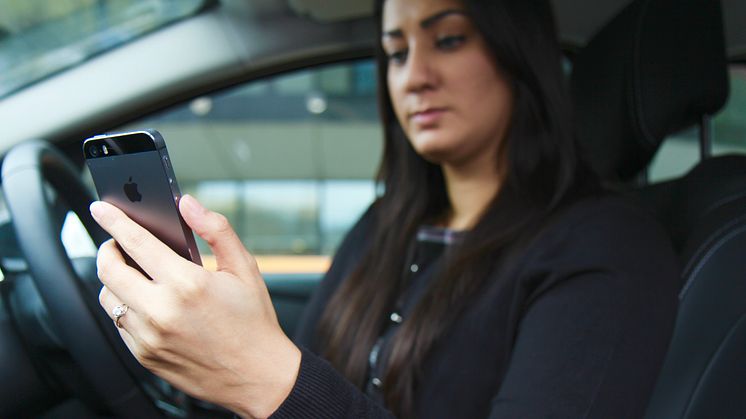
Press release -
Only three in five drivers who use a handheld phone say causing an accident would make them kick the habit
Motorists say the actions of police, family members and road safety groups could have the greatest impact on changing their behaviour
Not even the thought of causing an accident appears to be enough for some drivers to permanently break the habit of illegally using a handheld phone at the wheel, research for the RAC’s Be Phone Smart campaign has found.*
While 60% of drivers said causing an accident would make them stop for good, the RAC is surprised the figure is not significantly higher given that the consequences can be so severe in terms of the impact on human life.
When given a range of scenarios** which might make a driver immediately stop using a mobile phone illegally, being personally responsible for causing an accident came top, followed by being caught or the threat of being caught by a police officer (55% and 54% respectively), knowing the victim of an accident where handheld phone use was a factor (54%), and causing a near-miss (53%).
The findings suggest a sizeable minority of drivers still do not see anything wrong with using a handheld phone illegally because they believe they are not likely to cause an accident or be stopped by the police. This is despite the clear risk of distraction while using a handheld phone – as shown by a number of high profile cases reported in the media – and the fact that police forces are now much more visible in their enforcement of the law on mobile phone use.
The penalties for using a handheld phone at the wheel got tougher from 1 March 2017, and followed findings from the RAC’s most recent Report on Motoring which shone a light on how the number of drivers using handheld phones while driving had increased alarmingly across the UK in recent years.***
Eighty six per cent of those motorists who admitted to using a handheld phone claimed they would be willing to give up the illegal habit for good. Drivers cited the police as being the group that would have the biggest positive influence on them stopping (25% of respondents), suggesting that enforcement of the law is key to getting motorists to change their ways.
Family members were also seen as having an important role in making drivers rethink how they use their phone in the car, with 18% of respondents saying this group would have greatest impact on them giving up. A similar proportion said that they thought the work of road safety campaigners would encourage them to kick the habit, followed by government (8%) and friends (6%).
The figures also highlight how being sat in stationary traffic increases the likelihood of drivers reaching for their phone and using it at the wheel with over half (57%) of those who admitted to using a handheld phone saying this was when they were most likely to do so. This suggests that addicted motorists are struggling to resist the temptation to use their phone, and perhaps use it to seek relief from the boredom of traffic jams.
Pete Williams, spokesperson for the RAC’s Be Phone Smart campaign, said: “It seems reasonable to expect that causing an accident while using a handheld phone would be enough to force every driver to change their ways. But our data suggests otherwise – while six in 10 motorists told us they thought that would motivate them to kick the illegal habit, that indicates a remarkable four in 10 didn’t think it would.
“This is a worrying statistic and suggests that some drivers are still failing to see just how distracting using a handheld phone at the wheel can be, even though it has been illegal in the UK since 2003.
“Our research also highlights the extent to which sitting in traffic congestion is intrinsically linked to the compulsion to interact with a handheld device – drivers see this as ‘spare time’ to fill by using their phone, but it remains illegal and dangerous.
“Handheld phone use has become rooted in the behaviour of some drivers and it is going to take a herculean effort to change their mindset. No single action will achieve this and we need to educate a combination of education so drivers understand the dangers, encourage them to give the habit up, and combine this with rigorous enforcement of the law, so those breaking the law can expect to get caught.
“But there have been some positive changes in recent months. Alongside the new tougher penalties, police forces are giving the offence greater focus with regular high-profile operations targeting offenders. As our research shows that the actions of the police could be key in making drivers change their ways, this has to be very welcome. Both the RAC and THINK! have also launched awareness-raising campaigns to explain the risks and urge positive action among motorists.
“Technology is gradually evolving too, to encourage drivers to do the right thing when they get behind the wheel. We are pleased that one of the most widely used smartphone operating systems, Apple’s iOS used on iPhones, is about to have an update that will offer a ‘drive safe’ mode. This will join a range of apps already available for Android, such as Agent, which encourage smarter phone use in the car or cab.”
Road Safety Minister Jesse Norman said: “The message is clear: do not be distracted by your mobile phone while driving. Holding and using your phone at the wheel risks serious injury and even death to yourself and others.
“It is shocking that so many people still use handheld phones at the wheel, which is why I’m calling on families and friends to make it as socially unacceptable as drink driving.”
IAM RoadSmart Chief Executive and Be Phone Smart partner Sarah Sillars OBE said: “It is clear from the RAC survey that breaking our addiction to smartphones is not going to be easy. The answer, as ever, lies in a connected approach to education, enforcement and technology. Responsibility lies with users at both ends of the call, message, tweet, update or share. Friends, family, workmates or bosses must take equally seriously their role in not encouraging illegal smartphone use.
“Our own surveys suggest that fear of those distracted by mobiles is now the fastest growing concern for drivers. The solution is simple – put the phone out of sight and out of temptation's way when you start up.”
Pete Williams continued: “The RAC is committed to doing its bit and we encourage every driver to read the advice on our campaign website and, for those that would either never dream of using a handheld phone or are ready to change their ways, make a quick online pledge that they can then share with friends and family – to help spread a positive message.
“Only time will tell if the message truly is getting through to motorists that combining illegal handheld phone use with the mentally demanding job of driving is a potential recipe for disaster.”
The Be Phone Smart campaign encourages drivers to rethink their relationship with their phone whenever they’re driving. It has the backing of a wide range of organisations and initiatives including the National Police Chiefs’ Council, THINK!, IAM RoadSmart, the Road Haulage Association, Road Safety GB, Transport Scotland and a number of UK police forces. At its core is a website offering hints and tips to drivers and provides an opportunity to make, and share via Facebook and Twitter, an online promise to not use a handheld phone at the wheel. The campaign hashtag is #BePhoneSmart.
What drivers told us would make them permanently stop using a handheld phone at the wheel:
- Being responsible for causing an accident while using a handheld phone (60%)
- Being stopped by a police officer (55%)
- The threat of points and a fine (54%)
- Knowing the victim of an accident where the person responsible was using a handheld phone (54%)
- Causing a near-miss while using a handheld phone (53%)
- Being the victim of an accident themselves (51%)
- Knowing someone who had caused an accident while using a handheld phone (48%)
- Seeing footage of a driver causing an accident (41%)
- Media coverage of drivers being sentenced for using a handheld phone at the wheel (36%)
- Fear of losing their job if they got caught (34%)
- A national awareness campaign highlighting the risks/penalties (33%)
- A family member asking them to stop (32%)
- Availability of a free 'drive safe' app for their smartphone that limits its operation while driving (30%)
The handheld mobile phone law: a timeline
December 2003 – Offence of using a handheld phone at the wheel comes into effect
February 2007 – New penalties for the offence introduced: three points and £100 fine
March 2016 – Consultation on increasing fixed penalty notice and penalty points for drivers using a handheld phone while driving ends
15 September 2016 – RAC Report on Motoring research highlights scale of handheld mobile phone use by drivers
17 September 2016 – Government responds and announces increase in penalties (six points and £200 fine)
1 March 2017 – new penalties for illegal phone use in England, Wales and Scotland come in: six points and a £200 fine; THINK! campaign begins; Be Phone Smart campaign launches
30 May 2017 – figures obtained by the Press Association show that nearly 6,000 drivers were caught using a phone illegally in the first month since the penalties were increased
Topics
Categories
Notes to Editors
* Source: RAC Opinion Panel research. 35% of base of 2,137 admitted to having used a handhed phone while driving
** Full list at foot of this press release
About the RAC
First formed in 1897 the RAC has been looking after the needs of its members and championing the interests of motorists for 120 years.
Today it has more than eight million members and is one of the UK’s most progressive motoring organisations, providing services for both private and business motorists. Whether it's roadside assistance, insurance, buying a used car, vehicle inspections and checks, legal services or up-to-the-minute traffic and travel information – the RAC offers a solution for all motoring needs. The RAC is committed to making motoring easier, safer, more affordable and more enjoyable for drivers and road users.
The RAC is the motorist’s champion and campaigns to support the interests of its members and UK motorists at a national level. This includes voicing concerns about the increasing cost of motoring, particularly the price of fuel and the high level of tax levied on it, advancing levels of road safety, and supporting the needs of all drivers, from young to old.
The RAC’s annual Report on Motoring – first published in 1989 – provides a clear insight into the concerns and issues facing today’s motorists.
For the very latest news on UK fuel prices, check RAC Fuel Watch or follow #racfuelwatch on Twitter. RAC Fuel Watch is a comprehensive guide to the latest UK unleaded petrol and diesel prices – both at the wholesale level and at the pump. RAC Fuel Watch analyses how prices changed through the previous month and compares the most recent prices with those from three, six and 12 months before.
Key facts:
- RAC patrols fix four out of five vehicles at the roadside and on average within 30 minutes
- RAC vans carry more than 500 parts and tools to get members’ vehicles going again
- 92% of members would recommend RAC Rescue to their friends and family

